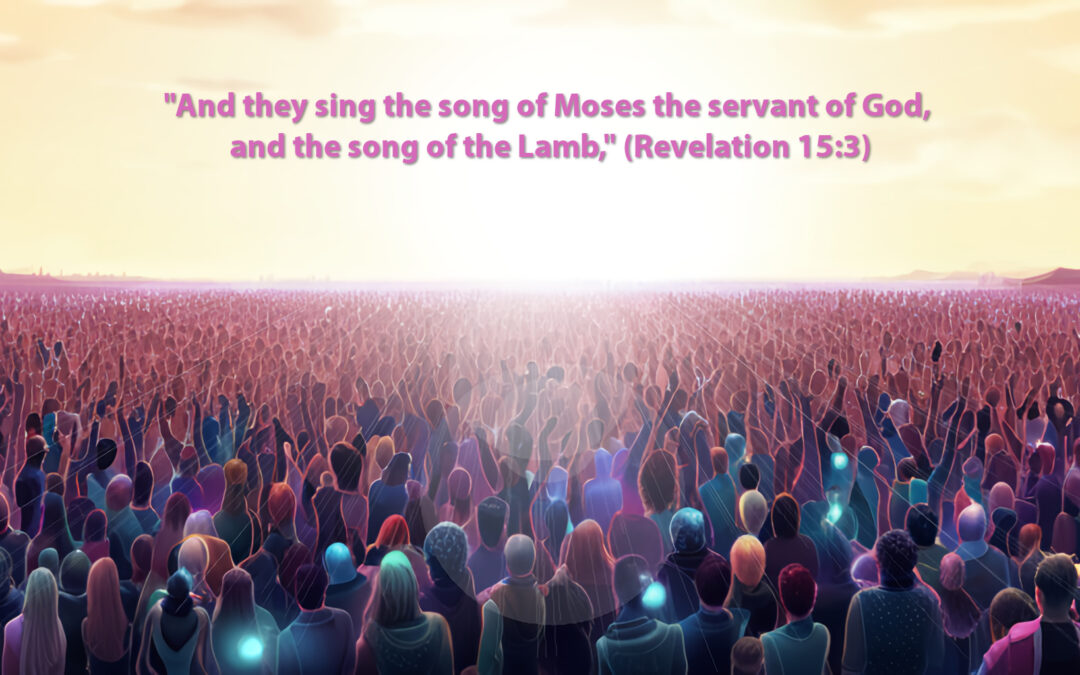“And they sing the song of Moses the servant of God, and the song of the Lamb, saying, ‘Great and marvelous are thy works, Lord God Almighty; just and true are thy ways, thou King of saints.’” (Revelation 15:3)
The contextual passage surrounding this verse in Revelation 15 paints the setting for this glorious song of the saints as described by the Apostle John, “I saw what looked like a sea of glass glowing with fire,” (15:2). We are told that each member of this heavenly choir standing beside this sea of glass has a harp “given them by God,” and they are singing in orchestral unison “the song of God’s servant Moses and of the Lamb.” What a scene to behold!
The song of Moses and the song of the Lamb are primarily one and the same in that both are songs of praise to God for his mighty deliverance, which the saints of both the Old and New Testaments can now sing together in harmony.
The song of Moses referenced here is likely the one documented in Exodus 15:1-18. Here Moses leads the children of Israel in a beautiful song of praise to the Lord for his miraculous deliverance from Pharoah and his army. This celebration occurred after God parted the Red Sea for his people to walk safely across… and then released the massive wall of water on either side to drown the entire Egyptian army on horses and chariots who were in hot pursuit! This song of Moses aptly yields itself to multiplied songs of thanksgiving to the Lord for all his deliverances.
Similarly, the song of the Lamb in Revelation 15 celebrates God’s deliverance of his New Testament saints from the “beast” and his evil spiritual forces. John Cotton said, “And as for the Song of the Lamb, which those that had victory over the Beast sang, were surely all those songs of David which celebrate either his own deliverances from Saul, or the deliverance of the church from Egypt, or Babylon, or from other enemies, as they all may justly own and bear that title. David certainly acknowledges in his songs that the Spirit of the Lord spoke by him, and that his word was in his tongue (2 Sam. 23:2). What Spirit of the Lord was that, but the Spirit of the Lord Jesus?”[1]
Revelation 15:3 proclaims, “Great and marvelous are thy works, Lord God Almighty. Just and true are thy ways, Thou King of saints.” And then verse 4, “Thou only art holy. Who shall not fear thee, O Lord, and glorify thy Name? For all nations shall come and worship before thee, for thy judgments are made manifest.”
Both songs proclaim the majestic power of Almighty God who works wonders on behalf of his people. Both are songs of victory and triumph of justice and righteousness over evil. And both extol the nature, character, and virtues of God as he works to accomplish all his plans and purposes to his own glory and the good of his people. Let us therefore all sing together, “Great and marvelous are thy works, Lord God Almighty!”
Contemplations:
- What a most excellent thing that the song your people sing in heaven is the song of Moses and the song of the Lamb at the same time!
- It is good for me to remember Moses and his song for in it I see the faith of the patriarchs, the hope of the prophets, the labors of the apostles, the truth of the evangelists, the blood of the martyrs, the zeal of the confessors… and I give you glory for all your work through Christ Jesus.
- God of my fathers, to you I give praise because you have granted me wisdom and courage in great measure and have wonderfully opened my eyes that I may see and know more of you through your Word.
Further references for Revelation 15:3:
Psalm 145:17; Deut. 32:4; Rev. 5:9; Deut. 31:30
[1] John Cotton, Singing of Psalms a Gospel-Ordinance, (London: Printed for J.R. … and H.A. .., 1650), 27.


